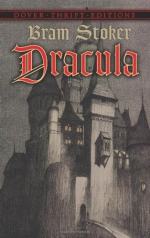R. M, Renfield, age 59. Sanguine temperament, great physical strength, morbidly excitable, periods of gloom, ending in some fixed idea which I cannot make out. I presume that the sanguine temperament itself and the disturbing influence end in a mentally-accomplished finish, a possibly dangerous man, probably dangerous if unselfish. In selfish men caution is as secure an armour for their foes as for themselves. What I think of on this point is, when self is the fixed point the centripetal force is balanced with the centrifugal. When duty, a cause, etc., is the fixed point, the latter force is paramount, and only accident or a series of accidents can balance it.
LETTER, QUINCEY P. MORRIS TO HON. ARTHUR HOLMOOD
25 May.
My dear Art,
We’ve told yarns by the campfire in the prairies, and dressed one another’s wounds after trying a landing at the Marquesas, and drunk healths on the shore of Titicaca. There are more yarns to be told, and other wounds to be healed, and another health to be drunk. Won’t you let this be at my campfire tomorrow night? I have no hesitation in asking you, as I know a certain lady is engaged to a certain dinner party, and that you are free. There will only be one other, our old pal at the Korea, Jack Seward. He’s coming, too, and we both want to mingle our weeps over the wine cup, and to drink a health with all our hearts to the happiest man in all the wide world, who has won the noblest heart that God has made and best worth winning. We promise you a hearty welcome, and a loving greeting, and a health as true as your own right hand. We shall both swear to leave you at home if you drink too deep to a certain pair of eyes. Come!
Yours, as ever and always,
Quincey P. Morris
TELEGRAM FROM ARTHUR HOLMWOOD TO QUINCEY P. MORRIS
26 May
Count me in every time. I bear messages which will make both your ears tingle.
Art
CHAPTER 6
MINA MURRAY’S JOURNAL
24 July. Whitby.—Lucy met me at the station, looking sweeter and lovelier than ever, and we drove up to the house at the Crescent in which they have rooms. This is a lovely place. The little river, the Esk, runs through a deep valley, which broadens out as it comes near the harbour. A great viaduct runs across, with high piers, through which the view seems somehow further away than it really is. The valley is beautifully green, and it is so steep that when you are on the high land on either side you look right across it, unless you are near enough to see down. The houses of the old town—the side away from us, are all red-roofed, and seem piled up one over the other anyhow, like the pictures we see of Nuremberg. Right over the town is the ruin of Whitby Abbey, which was sacked




